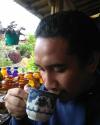CHID 250: (HOME 101) Nature, Culture, and Belonging
Instructor: Dimas Iqbal Romadhon (dimas@uw.edu)
Schedule: MW, 2:30-4:20, CDH 115
Office hour: By appointment (dimas@uw.edu)
Welcome to HOME 101: Nature, Culture, and Belonging
What makes a place a home? Can gardening become a medium for self-expression and personal reflection? What can city exploration teach us about place, people, and marginalization? How to use camera lens to make kin with non-human species?
In this course, we will examine the concept of “home” through critical theories and creative methods. We will explore how gardening, place sketching, city exploration, and photography can be used as tools for understanding our relationships with ourselves, others (human and non-human), and the environment. Throughout the course, we will delve into theories such as space/place, decolonization, environmental justice, and multispecies relationships. We will also engage in auto-ethnography, literary analysis, observation, and photovoice as methods to deepen our understanding of these concepts. We will also explore the era of the Anthropocene, where human activities are believed to have had significant impacts on the planet, and scholarly critics of this era. Eventually, we will examine our role in this global crisis and explore ways to foster positive change. This course will be intellectually stimulating while still providing a fun and engaging learning experience. By the end of the course, students will have a deeper understanding of their relationship with “home” and the world around them.
Cheat sheet: contains theories and concepts discussed in class.
Grading and assessment:
By enrolling in this course, you are committed to attending 80% of class meetings and participating in ALL FOUR class projects (FIVE if you are taking the optional Writing Credit).
The default grade is 4.0, which will be graded down based on your participation and commitment to the class and not on the quality of your work. I reserve the right to reject your submitted work if it doesn't show a serious effort–I will let you know why I think so, and you are welcome to resubmit it. You can also do additional assignments to make up for some lost points (should be consulted with the instructor).
Class projects (Click each assignment for instruction and evaluation)
1. Individual Project: Gardening reflection (Due May 5, 2023)
2. Group project: Yesler Swamp Worksheet (Due May 31, 2023)
3. Elective project (Due May 18, 2023):
a. Exploring Relationships between People and Place through Song or Poetry
4. Final project: Photovoice project (Due May 22, 2023)
5. Optional assignment for students taking optional Writing credit (Due May 5, 2023)
*also mandatory writing workshop on April 19 after class
Class Schedule (subject to change, please visit regularly)
Theme: Introduction
March 27: Syllabus
March 29: Gardening diary
Novella Carpenter. Farm City: The Education of an Urban Farmer. Ch: 1-4, 35-36. (58 pages)
Front Porch. Cambodian refugee, Kimli Sieng, utilizes P-Patch community garden to grow herbs that remind her of home
Crosscut. How this immigrant farmer in Kent is reconnecting to her agrarian roots
Theme: Home, Place, Colonialism, and Decolonization
April 3: Home and place
Keith Basso. "Wisdom Sits in Places".
Optional:
Mohamed Latiff Mohamed. “Lost Nostalgia.” transl. Nazry Bahrawi.
Sophie Chao. "The Truth about Sustainable Palm Oil".
April 5: Colonialism and decolonization
Eve Tuck and K. Wayne Yang. 2012. “Decolonization is not a metaphor.” Watch this video from Professor Garnet Hertz for a quick overview of the article.
AWAKE, A Dream from Standing Rock (1 hour, 29 minutes)
April 10 & 12: Visit to Yesler Swamp
We will visit Yesler Swamp, located next to UW Center for Urban Horticulture.
For effective discussion purpose, we will divide into two groups. First group will take the tour on April 10, while the next group will be on April 12. Please RSVP through this link. Please be prepared for slippery trail due to the weather.
Reading:
Megan Asaka (dissertation). Unsettled City: Chapter One.
Theme: Environmental Justice and Marginalization
April 17: Environmental racism
Podcast Dr. Ayana Elizabeth Johnson and Alex Blumberg. “Black Lives Matter and Climate Change.’ (47 min).
Optional:
New York Times. How ‘Gardening While Black’ Almost Landed This Detroit Man in Jail.
NYU Gallatin. Black Environmentalism
April 19: Toxic Colonialism
PBS | The Last Generation
VICE | The World’s Dumping Ground for Nuclear Waste Doesn’t Want Fukushima’s Wastewater.
*Writing workshop for students taking Writing credit
Theme: More-than-human world
April 24: From Anthropocene to Chthulucene
Anna Tsing. Mushrooms at the end of the world. Pp. 1-36.
Optional:
Donna Haraway. "Tentacular Thinking: Anthropocene, Capitalocene, Chthulucene".
Watch: Anna Tsing & Donna Haraway: "Tunneling in the Chthulucene"
[Postponed] April 26: Guest lecture | Koko Lee
Talk description:
On Fire Neighbours hypothetically imagine the scenario when wild animals migrating to the cities due to habitat loss and degradation, and how these animals would wreak havoc upon our cities by demonstrating what poor neighbours we both would be if we lived side by side.
May 1: Multispecies justice (Classroom Location: THO 317, 3:00PM, please come 10 or 15 mins before the screening)
*we will have a movie screening of Dragon for Sale [preview] followed by a conversation with the producers.
May 3: Zoonosis (lessons from COVID-19)
Eben Kirksey. “The Emergence of COVID-19: A Multispecies Story.”
May 8: No class (instructor will be out of town)
No reading. Let’s talk about the theme and platform for our photovoice project.
May 15-17: No class. Working on projects
May 18: Elective project due
May 22: Photovoice project consultation (Meet on Zoom: https://washington.zoom.us/j/95519246458)
May 24: Presentation for gardening journal
May 24: Photovoice project due
May 29: No class--Memorial Day
May 31: Last day of instruction. Meet at CHID Lounge at 3:30pm, not 2:30 as usual.
